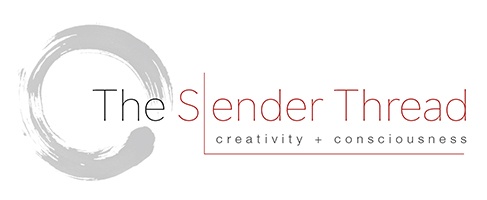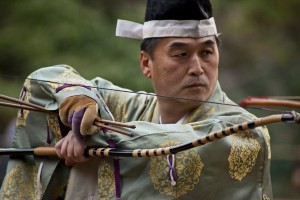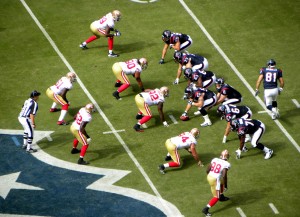The Art of the Game
I have been reading a marvelous essay on Zen swordsmanship by D.T. Suzuki in the book Zen and Japanese Culture. Swordsmanship teaches coherence, elegance, and purpose. Like most sports, it can—at its best—be employed as a powerful tool for human development.As we approach the Super Bowl, what might we expect from sports that leave lasting injuries on its participants and feed the national ego as well as our consumer fantasies? How could we say anything against the Super Bowl without seeming downright un-American and committing a secular sacrilege. What can team or individual sports, with their high degree of aggression and ego-involved performance, teach us?
Now… I have a riddle for you. Please read this quote below and tell me if not exactly who wrote it, but what discipline they call their own.
“When you get to be 57, and you’ve been world famous … met presidents and kings, and had books written about you, they ask you to write articles on subjects like convergence. Now, as I understand it, convergence means that society today is no longer pretending that there is any real difference between things like art and nature, science and religion, between the poetry a man makes out of words and the poetry God makes out of time and space.… To understand that there are no distinctions of any real importance in the affairs of men, that there is only one time and one place and one person and one truth. And that we are all contained in that time and place and person, and that the truth contains us all.”
Whatever you guess, your answer is probably wrong. The field that this individual belongs to is athletics—sports—and the author is Muhammad Ali.
Michael Murphy, founder of Esalen Institute and author of Golf in the Kingdom, argues that sports can and do, for some individuals, offer a path towards genuine wholeness, mindfulness, and collective knowing.
Even for the audience some of this becomes true. Witnessing the depth of personal mastery and the breadth of teamwork present in some teams can take your breath away, literally arresting you into the present moment. To have watched the Chicago Bulls with Michael Jordan was to receive the impressions of a highly refined art form. The success of the Bulls or the Boston Celtics or the LA Lakers needs no documentation. And the fact of their cooperation has been well discussed. Using Phil Jackson as my guide, I hope to offer snippets of wisdom from the sports experience for encouraging teamwork and individual realization.
Phil Jackson, former head coach of the Chicago Bulls and the LA Lakers, observes in Sacred Hoops: Spiritual Lessons of a Hardwood Warrior, “I’ve learned that the most effective way to forge a winning team is to call on the players’ need to connect with something larger than themselves. … It requires the individuals involved to surrender their self-interest for the greater good so that the whole adds up, to more than the sum of its parts.
This isn’t always an easy talk in a society where the celebration of the ego is the number one national pastime. Yet even in this highly competitive world, I’ve discovered that when you free players to use all their resources,—mental, physical, and spiritual—an interesting shift of awareness occurs. When payers practice what is known as mindfulness—simply paying attention to what’s actually happening— not only do they play better and win more, but they also become more attuned with each other. And the joy they experience working in harmony is a powerful motivating force that comes from deep within…”
What sports actually provides most of us, I believe, are points of entry for engaging collective wisdom and a broader awareness.
Personal Mastery
True excellence in any endeavor is a sight to behold. It calls forth wonder and awe, and inspires us to completion in our own domain. It is sexy and magnetic, offering hints of our potential wholeness. If we learn the forces and laws required to master one thing, it helps us in many other things. Most true geniuses in any domain recognize that, through their individual gifts, they are privileged to serve others and life itself.
Muhammad Ali again offers a moving observation: “Sports has to be the most convergent of all human activities because athletes know that there is no fundamental difference between body, mind, and spirit. To be truly great, an athlete must develop all three together, exercise them all together, and bring the strength of all of them to bear on the contest. Only then is greatness possible, and only then does victory have universal meaning because it reflects the fullness and the richness of the human heart.”
Do Not Hold the Ball for Longer than Two Counts
Teamwork is selflessness in action. When you hold the ball for too long, you become the focus. When the ball moves through you, your skill is needed at this moment, but then the focus shifts and the energy moves between the group. It is the same with thoughts, ideas, resources, and services. Everything moves through us for the benefit of an evolving whole. Holding on, and seeking the limelight, impedes the flow necessary for realizing the synergy of teamwork.
Awareness is Everything
A dual attention, where one is aware of self and of one’s surrounding simultaneously holds the key to successful interaction. Through this dual awareness of self and surroundings, something within oneself simply knows or senses when to lead and when to follow in this extended dance of team interaction.
Phil Jackson states that “being aware is more important than being smart.” He goes on to say, “Basketball is a complex dance that requires shifting from one objective to another with lightning speed. To excel, you need to act with a clear mind an be totally focused on what everyone on the floor is doing. Some athletes describe this quality of mind a ‘cocoon of concentration’… [becoming] more acutely aware of what’s happening right now, this very moment. The secret is not thinking… so that your body can do what its been trained to do without your mind getting in the way. All of us have had flashes of this sense of oneness—making love, creating a work of art—when we’re completely immersed in the moment, inseparable from what we’re doing. … The point is to perform every activity, from playing basketball to taking out the garbage, with precise attention, moment by moment.”
Great possibility comes with great danger
What Phil Jackson calls “the howl of the ego” is a trusim that we might well seek the truth of within ourselves. Greatness and weakness are often located adjacent to each other, the place of our greatest strength casts its shadow, and is also the vibrating region that contains our greatest challenge and our vulnerability. Our ally is first perceived as a demon, a shadow, before we can turn its powerful energy to our advantage and for the sake of the common good. This metaphor speaks to many areas in our lives.
Breathtaking skill is often accompanied by a boundless ego. It must be surrendered; its force must be harnessed and turned in the direction of service for the good of the team, for the sake of the whole. Through active inner work, self-interest can be expanded deeply, to include others first, then to attend to the welfare of the team, and finally to serve the higher currents of thought and energy found in life itself.
The Art and Practice of Acceptance
Life is change, the game is change, often uninvited change. The practice of acceptance comes from a generous embrace of ambiguity, of not knowing. We stay in front of the moment, like the Zen swordsman, ever prepared, on the threshold of forceful movement, yet graceful, loose and relaxed. From stillness within, we find a place for right action, stemming from an awareness of our place within a changing environment. Einstein once described his rules of work that Phil Jackson emulates: “One: Out of clutter, find simplicity. Two: From discord, find harmony. Three: In the middle of difficulty lies opportunity.”
Deep acceptance of the moment is the first step towards mastery of it. Seeing precedes action. And action naturally follows seeing. According to Jackson, “The key is seeing and doing. If you’re focusing on anything other that reading the court and doing what needs to be done, the moment will pass you by.”
Learning Compassion
Compassion means caring. From an active empathy towards others and towards the conditions on the court, we cultivate a caring for the whole, for oneself and others, and the game itself. We learn to value giving and receiving energy. Empathy and compassion loosen the boundaries of our own skin, where we become one with others, seeing them rightfully as extensions of ourselves. We become the hands, the feet, the torso of a collective body. Our energy extends into a field beyond our skin, touching and blending with other’s energy fields. Can we learn to be responsible for our thoughts and emanations, as well as our actions. And our growing inward attention and empathy towards others create a palpable change in the atmosphere that everyone feels, players and audience alike.
Phil Jackson raises the question, “There has to be another way, an approach that honors the humanity of both sides while recognizing that only one victor can emerge. … a wide angle view of competition that encompasses both opponents as partners in the dance.”
Then, Jackson makes the surprising admission: “Love is the force that ignites the spirit and binds teams together.”
Love of the game, Nonattachment
Why do we play, at our lives, at our work? Because we must is the only answer that rings true. Because we love what we do, and we honor the energies of the game. Without it, our lives would lack purpose and meaning. We “follow our bliss” and see where it goes, where it takes us without being attached to an outcome.
Sports teach a fresh response to each moment for its own sake. Jackson writes: “You can’t step into the same river twice.” Each moment demands its own response, each problem demands its own solution, each endeavor can be approached with a fresh mind, a clean slate. What worked in the past may not be what is needed, now. Avoid the routine formula, the easy answer; it is a withered, lifeless thing that contains entropy, not life.
The Soul of Teamwork
We know by this time that the power of we is greater than the power of me. The soul of teamwork lies within finding the fragile balance between individual accomplishment and a group mind. One informs the other, and they build on each other in a continuing, growing symphony of instruments and music.
Jackson reminds us,. “When a player surrenders his self-interest for the greater good, his fullest gifts as an athlete are manifested. … It’s funny—by playing within his natural abilities, he activates a higher potential beyond his abilities, a higher potential for the team. It changes things for everybody. All of a sudden, the rest of the team can react instinctively to what the player is doing. And it just kind of mushrooms out from there—the whole begins to add up to more than the sum of its parts. … It’s as if they become totally connected with to one another, in sync with one another, like five fingers of one hand. Then one finger moves, the rest of them all react to it.”
Excerpted in part from When Two or More Are Gathered Together: The Power of Collective Intelligence


